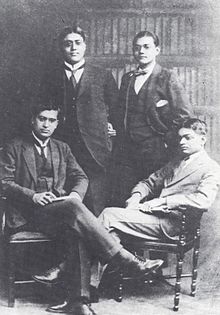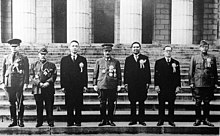杉山龍丸さんに感動して、ご長男・杉山満丸さんの存在を知り、電話を掛けたのは、10年前になる。以来ご上京される度にお会いして 出版記念講演会に出席させて頂いた。
インドにONGC(インドガス石油公社)商談で通っていた時に、日本人なのが判ると、突然「私の名前は杉山龍丸です」と話しかける人が何人もいた。
不思議なことをいうなああ、杉山龍丸さんって誰だろう? 長年の疑問を10年以上前に調べたら, Green Fatherとインドで呼ばれた方だった。
建国の父は マハトマ・ガンジー。植林の父は杉山龍丸さん。

先週、Tokyo Bay International School(校長Yasmeen Nigarさん)のお祭りに誘われて、亀戸に出かけたところ、理事長のJahir Hussainさんから、来日中のK.Navarajさんたちを紹介された。会社に来て頂いて話が弾み、
_______________

_______________

満丸さんは お父様とそっくり大きな人だ。
右端は 公益財団法人 日印協会参与の宮原 豊さん(JETOROご出身)

_______________
ナバラージさんに Green Fartherの長男が福岡にいらっしゃるぞ。会わないか? インドは、「杉山家の人々」に、何にもしていないんだよなあ? 人間として、まずいのでは?? 満丸さんと話しますか?
タクシーの中で即電話。直接お話をして貰ったら、大変感動されて、是非、お会いしたいという。さっそく満丸さんに上京してもらった。
Green Father の話で、一行は、熱くなった。
満丸さんの著書は3冊ある。また龍丸さんのご本も4,5冊ある。まだ一冊しか 英語に翻訳されていない。
日本語の達者なジャヒール・フセイン理事長と校長のヤスミン・ニガールさん それにナバラージュさんたちが 翻訳してくれることになった。完成して出版されれば 「インドと日本の距離」は 精神的にも一気に近くなるはずと確信する。
来年3月に、満丸さんはインドにご招待された。きちんと歓迎されると思う。私も同行させて頂こうかな?
あ~しあわせ!
_____________

________________


___________________
インドの砂漠を緑に変えた グリーンファーザー 杉山龍丸
杉山龍丸
杉山 龍丸(すぎやま たつまる、1919年(大正8年)5月26日 – 1987年(昭和62年)9月20日)は、日本の陸軍軍人。インドの緑の父(Green Father)と呼ばれる人物である。「夢野久作と杉山三代研究会」の杉山満丸は息子
福岡県福岡市出身。祖父は政財界のフィクサーともいわれた杉山茂丸、父は作家の夢野久作である。弟は詩人の杉山参緑。1937年(昭和12年)福岡中学校(現福岡県立福岡高等学校)卒業後、1940年(昭和15年)陸軍士官学校(53期)を卒業し、ボルネオでは胸部貫通銃創の重傷を負う。陸軍少佐で終戦を迎える。
戦後、3万坪の農地を売り、緑化の費用にあてた。インドの政府や個人の協力を得て、インドの各地にあった砂漠地帯や土砂崩壊の地域を緑化したが、日本の政府や企業などからは理解や協力が得られず、日本ではあまり知られていない。
1955年(昭和30年)戦友から、日本で農業を学んでいたインド人を紹介され杉山農園で農業技術を教えた。初めてインドに行ったのは1962年(昭和37年)、砂漠となったパンジャブ州を見て、国道1号線沿いの延長470キロメートルに、成長が早く根が深くパルプの原料となるユーカリを植林し、ヒマラヤからの地下水脈をせき止めて水を確保することを提案した。また、国際文化福祉協会を設立しインド救援の寄付金を募った。
____________

____________
植林開始と共に旱魃に襲われ、3年間で500万人が餓死する事態に、インド政府も事業中止に至ったが、杉山は杉山農園を売却して資金を調達し、家族を日本に残して渡印した。のち、4万坪の福岡市の杉山農園、家屋敷は人手に渡り、借家住まいとなり、国連関係者からの環境会議出席の求めに友人から旅費を借りて出席した。祖父・茂丸が台湾で関与した蓬莱米をインドに移植することに成功している。
終始、日本政府からの援助は無く、学界からは黙殺され、国際文化福祉協会の財団法人認可申請もいまだ認められていない。インド、パンジャブからパキスタンまでの国際道路のユーカリ並木とその周辺の耕地は杉山の功績であるとされている。
1965年の「ベトナムに平和を!市民文化団体連合」(後の「ベトナムに平和を!市民連合」)結成の際には、玄洋社国際部長として呼びかけ人となっている。
________________
Green Father
At the time, a number of villages in the northern region of India were suffering from starvation and loss of crops due to the rapid desertification of their land.
Sugiyama Tatusmaru fulfilled the wishes of his grandfather and Rash Behari Bose, dedicating his life to the reforestation and vitalization of India. To this very day, the area that Tatsumaru worked on remains lush with greenery and rich agriculture.
Below is a video of this remarkable story. I have written English subtitles for the film, which you can read by clicking on the “CC” button in the bottom right-hand corner of the video. The full English script is also available below.
________________________

_____________

_____________
杉山家の教え、朱子学と陽明学【CGS 神谷宗幣 杉山満丸 第99-1回】4,037 回2017/10/04 ChGrandStrategy
ChGrandStrategy
__________________



____________________________

_________________


__________________
今回は玄洋社と自由民権運動についてです。 玄洋社を立ち上げた方々はどのようにして思想を学んだのでしょうか
____________________
「砂漠に緑を~緑の父・杉山龍丸の軌跡~」 KBC創立45周年記念番組 3,138 回 2018/06/21  masaaki suemoto
masaaki suemoto
参考:「将校は砂漠に木を植えた」杉山龍丸 https://youtu.be/BFWGDvaHONE インドの砂漠を緑に変えた グリーンファーザー 杉山龍丸 https://www.youtube.com/watch?v=IP5Tj… 福岡の男性“全財産投じインドを緑化” https://www.youtube.com/watch?v=REz_u…
_________________

_________________

______________________

_____________
ところで Navarajさんにチャンドラ・ボースさんの遺骨が東高円寺・連光寺にあるぞ。というとぜひ訪ねたいという。マハトマガンジーさんは、無抵抗主義でインドの独立を勝ち取ろうとした。
チャンドラボースさんは 軍隊を組織してイギリス軍と闘い独立を勝ち取ろうとした。当時のデサーイ首相が、政権を追われた後、ガンジー派が力をもって、チャンドラボースは台湾に逃れた。日本軍の将校が日本に連れて行こうと飛行機に載せたが離陸直後墜落。遺骨を福岡経由、東京に持って行った。ちょうどマッカーサーが日本に到着日だったそうだ。

スバス・チャンドラ・ボース(Subhas Chandra Bose、ベンガル文字:সুভাষচন্দ্র বসু ![]() 発音、1897年1月23日 – 1945年8月18日)は、インドの独立運動家、インド国民会議派議長(1938 – 1939年)、自由インド仮政府国家主席兼インド国民軍最高司令官。民族的出自はベンガル人。ネータージー(指導者、नेताजी, Netāji。ネタージ、ネタジ とも)の敬称で呼ばれる。なおベンガル語の発音は、シュバーシュ・チャンドラ・ボーシューが近い。
発音、1897年1月23日 – 1945年8月18日)は、インドの独立運動家、インド国民会議派議長(1938 – 1939年)、自由インド仮政府国家主席兼インド国民軍最高司令官。民族的出自はベンガル人。ネータージー(指導者、नेताजी, Netāji。ネタージ、ネタジ とも)の敬称で呼ばれる。なおベンガル語の発音は、シュバーシュ・チャンドラ・ボーシューが近い。
で遺骨は理解を示した。連光寺に収められた。

___________






 今回のテーマは日露戦争になります。 日露戦争の裏で暗躍していた玄洋社や日露戦争がアジアにもたらしたものなどを解説していただきました。
今回のテーマは日露戦争になります。 日露戦争の裏で暗躍していた玄洋社や日露戦争がアジアにもたらしたものなどを解説していただきました。
English script:
There is a precious 8 mm film that was recorded about 40 years ago. It shows a village in India. A Japanese man was welcomed by the people of the village. Sugiyama Tatsumaru is seen receiving great respect and reverence. They called him Green Father.
Shortly after India received independence from England, Tatsumaru first set foot on Indian soil in 1961. In those days, India was far away. He later visited India many more times, but when they saw him for the very first time, 42 year old Tatsumaru was strongly impacted. From the airplane window, all he could see was desert. His breath was taken away by the sight of the barren, red landscape.
“So this is India…”

India was increasingly turning into desert, agriculture and lives were suffering, and most of the people were suffering from chronic starvation. It is said that one year when it did not rain, over five million people lost their lives. He was struck hard by this harsh reality. Tatsumaru made a vow.
“I will save the people of India.”
He put 14 billion yen towards helping India. Who was this man? Sugiyama Tatsumaru was hailed as the Green Father, and spent 14 billion yen on the reforestation of India.
Tatsumaru was born in 1919, in Fukuoka prefecture. His father, Sugiyama Taido, was a novelist known by the pen name, Yumeno Kyūsaku.
It is said that he was Itō Hirobumi’s right-hand man. His grandfather, Shigemaru, was a man of extraordinary achievement in the world of politics. When he went overseas for international trade work, he saw that Asia was being eaten alive by Europe and America.
Seeing this, he vowed, “When we become independent, let us establish a system of agriculture that will be the foundation of the country.”
In 1901, he purchased a 38 acre plot of land in Fukuoka. He established a plantation there, and hired students from every country across Asia. He was a great supporter of the Indian independence movement, and enthusiastically taught agricultural skills to Gandhi’s disciples.
Tatsumaru’s eldest son, Sugiyama, still remembers his father’s wish.
“When my father was 16, his father and grandfather both passed away within the same year. He was still very young, so their loss must have had a great impact on him.”
His grandfather, Shigemaru, left him with one request,
“You must save the people of Asia.”

Tatsumaru honoured his request, and even after India gained independence, he continued to bring in students from India and teach them agricultural techniques.
When Tatsumaru was 36, he received a phone call that would change his fate forever. It was a call from Nehru, the first prime minister of India. He had heard of Tatsumaru’s work with the students. During the call, Nehru made a request.
“I want you to save India.”
India was turning into desert, agriculture was failing, and the people of India were starving.
______________________

__________________________
Tatsumaru boarded a flight to India.
Agriculture will end their famine. But for that to happen, water was essential. Every day, Tatsumaru searched tirelessly for a water source that would bring green back to the land. But, no such water could be found. Just as he was about to give up, a strange sight caught his attention.
In the blazing desert heat, there was one spot where cattle were resting.
“There’s shade nearby, so why are they resting here?”
Tatsumaru began to dig up the ground, and noticed that the dirt was damp.
“There’s water in the desert!”
Even if the land is dry on the surface, there was water flowing underground. Tatsumaru decided to plant trees there in the desert. He chose to plant eucalyptus trees, which he knew to thrive in the deserts of Australia.

____________________

____________________________
“They are strong in the heat, and grow quickly. Eucalyptus trees will pump the water up to the surface, and we will be able to grow crops.”
Northern India borders the foot of the Himalayas. Water must be flowing from the mountains into the ground. We should plant the trees in a line along the national highway. Tatsumaru visited each village located along the highway, asking for their cooperation.
“Together, let’s grow crops and thrive.”
But, people were against it. No one listened to Tatsumaru and his ideas about the efficacy of the eucalyptus trees. They were too busy struggling to survive. Even then, Tatsumaru did not give up.
“If we plant the eucalyptus trees, they will be saved. There is no doubt.”
His only driving force was the memory of his grandfather’s wish. In the scorching Indian heat, he used his own drinking water to plant the trees.
___________________

_________________________
And then…
“Heave, heave!”
People began to change.
“He came all the way from Japan. Let’s put our faith in him.”
Japanese cheers echoed across the desolate desert.
“Heave, heave!”
And now…
All along the highway that was once lifeless and barren, green eucalyptus trees are thriving. The trees are 15 metres tall.
Tatsumaru’s vision became a reality. The trees pumped the water to the surface, and the 470 km stretch of highway is now lush with vegetation. The trees blessed the land with water, making it possible for rice fields, and wheat and barley crops to all thrive. The number of deaths by starvation decreased dramatically.
“It is all thanks to the abundant plants that were are able to live like this.”
Tatsumaru’s simple reforestation plan was spread from village to village, and from person to person. But, Tatsumaru’s efforts did not end here.
The desert was the main cause of starvation in India. He thought about how to prevent this. The Sivalik Range was causing the desert to increase.
The Sivalik Range is a mountain region in the Himalayas. Day and night, the hills continue to erode, and the resulting sand is contribution to the expansion of desert land.

Tatsumaru was certain that eucalyptus trees were the answer. Their roots would also dig into the ground and prevent erosion. However, the solution was not so simple.
The Sivalik Range spans 3000 km. That’s longer than Japan. Planting eucalyptus trees along the entire range would require a lot of money and time. However, Tatsumaru calmly said,
“There is no problem. As long as you believe, anything is possible.”
He sold the vast acreage in Fukuoka that he had inherited from his grandfather, and used the money to fund his eucalyptus project. It was no small amount of money. By today’s calculations, it was 140 billion yen.
For Tatsumaru, however, he was only fulfilling his grandfather’s dream.
“You must save the people of Asia.”
Tatsumaru vowed that he would accomplish this difficult task, even if it meant dedicating his entire life to it. To save the people of India from starvation, we must stop the root cause of desertification. He mustered up his strength and tirelessly got to work planting the trees, day in and day out.
However, Tatsumaru did not live to see his dream fulfilled. One day, he suffered a stroke and collapsed. He was 68 years old. His son, Sugiyama, is astonished by his father’s tenacity.
“When he collapsed, it was intense. He started making sounds, and nearly bit through his lip. He had such a mortifying expression on his face. He knew that there was so much work left unfinished. For two years and two months, he battled his illness. You could tell there was so much more that he wanted to do.”

The Sivalik Range. At one time, it was plagued by frequent landslides. But now, it is covered in lush greenery. The land that was once dry and cracked has been revitalized.
Tatsumaru carried out his grandfather’s wish. He brought abundance to the people of these villages. His passion resonates in the hearts of the Indian people.
“We made a promise. Sugiyama dedicated his life to bringing green to our land. Just as he did, we also vow to protect these trees with our lives.”
“As long as you believe, nothing is impossible.”
Perseverance in the face of great challenges. That was Tatsumaru’s life. In India, there is a saying,
“Gandhi was the father of independence. Tatsumaru Sugiyama was the father of green.”
_________________
夢野久作と杉山3代研究会(3/17)-「日印親善の父・グリーンファーザー杉山龍丸の行動力」についてインド大使館員がプレゼン https://www.youtube.com/watch?v=7pP9Z…
http://tanizokolion.fc2web.com/sugiya… 杉山龍丸の息子の杉山満丸氏
https://ja.wikipedia.org/wiki/%E6%9D%…
満丸氏の投稿記事 https://ameblo.jp/greaterasia/entry-1… 杉山満丸氏のフェイスブック https://www.facebook.com/mitsumaru.su…
ljADAZrsXqwjJHzU1zKxAysPbBUmz28ew-4VWJFM
杉山満丸氏が管理している「「夢野久作と杉山三代研究会」フェイスブックと関連HP https://www.facebook.com/kyuusakudogu…
o_card_work&timeline_context_item_source=100003316818554
「夢野久作と杉山三代研究会」 https://dogramagra2018.amebaownd.com/ https://camp-fire.jp/projects/view/66155
杉山龍丸 http://tanizokolion.fc2web.com/sugiya…
杉山茂丸 http://tanizokolion.fc2web.com/sugiya…
1897年にインド(当時はイギリス領インド帝国)のベンガル州カタック(現在のオリッサ州)に生まれた。父親は弁護士で、イギリス人により過酷な扱いを受けていたインド人の人権を教護することもしばしばであった。ボースはこの父親から大きな影響を受けたと後に語っている。
その後カルカッタ大学に進んだ。大学ではイギリス人教師の人種差別的な態度がインド人学生の反感を買い、学生ストライキが勃発した。ボースは首謀者と見られ、停学処分を受けた。
カルカッタ大学で学士号を取得し、1919年に、両親の希望でイギリスのケンブリッジ大学フィッツウィリアム・カレッジに大学院留学した。大学院では近代ヨーロッパの国際関係における軍事力の役割について研究し、クレメンス・フォン・メッテルニヒの妥協無き理想主義に感銘を受けたと回想している。
独立運動家
1920年にはインド高等文官試験を受験した。ボース自身の回想では試験には合格したものの、このままではイギリス植民地支配の傀儡となるだけだと判断して資格を返上した]。ただし、二次試験の乗馬試験で不合格となったという異説も存在する[1]。いずれにせよこの頃からボースはインド独立運動に参加するようになっていった。
1921年にマハトマ・ガンディー指導の反英非協力運動に身を投じた。ボース自身は「ガンディーの武力によらぬ反英不服従運動は、世界各国が非武装の政策を心底から受け入れない限り、高遠な哲学ではあるが、現実の国際政治の舞台では通用しない。イギリスが武力で支配している以上、インド独立は武力によってのみ達成される」という信念を抱いており、ガンディーの非暴力主義には強く反対していた。

ボースは、この頃イタリアで台頭してきており、イギリスのウィンストン・チャーチルをはじめ世界中で喝采と注目を浴びていたファシズムに魅了され、1926年には「ファシズムと共産主義の新たな総合をインドは実現する」べきであると主張した[2]。そのためイギリス当局は彼を明白なファシストと見なしていた[2]。ボースは、議会内で反ファシストから圧力を受けると自身の見解を穏健化させ、ファシズムではなくトルコのケマル・アタテュルクによる権威主義に関心を向けるようになった[2]。
ボースは1924年にカルカッタ市執行部に選出されるも逮捕・投獄され、ビルマのマンダレーに流される。釈放後の1930年にはカルカッタ市長に選出されたが、ボースの独立志向とその影響力を危惧した英印植民地政府の手により免職された。
その後も即時独立を求めるインド国民会議派の左派、急進派として活躍し、勢力を伸ばした。ガンディーは組織の分裂を心配し、1938年度の国民会議派議長に推薦した[3]。ボースはインド独自の社会主義「サーミヤワダ」を提唱し、若年層や農民、貧困層の支持を集めた。この成果に自信を持ったボースは翌年の国民会議派議長に立候補した。議長はガンディーの指名によって決定されることが慣例になっていたが、1年間の議長職だけでは満足しなかったボースは翌年以降も議長職に留まろうと考え、党内初の議長選挙を実施した[4]。この選挙でボースは、ガンディーの推薦するボガラージュ・パタビ・シタラマヤに大差をつけて勝利した。
しかしこの行為はガンディーの支持を失わせることになり、ガンディーを支持する国民会議派の多数派からの支持も失わせることになった[3]。ボースの動きを危険視した党幹部は彼に不信任を突きつけ[4]、議長辞任を余儀なくされた。さらに3年間役職に就けない処分も受けた[3]。議長退任後には前進同盟を結成し、独自の活動も開始した。またボースは統一インドとしての独立を望んでおり、独立派内でのムスリムとの対立が激化する中で、パキスタンが分離して独立する事態を憂慮していたという。ボースは政府から危険人物と見なされ、第二次世界大戦が勃発するとカルカッタの自宅に軟禁された[5]。
亡命
1939年9月の第二次世界大戦開戦、つまりイギリスとドイツの開戦を知ったボースは、「待望のイギリスの難局がついに訪れた。これはインド独立の絶好の機会である」と述べ[3]、独立のための武装闘争の準備を開始した。ボースは被搾取民族にとって独立達成こそが先決であり、反英諸国のイデオロギーについて論争する「贅沢な余裕はない」という見解を持っていた。1940年6月、フランス降伏とドイツ軍によるイギリス上陸が迫ったことを知ったボースはガンディーの元を訪れ、広範なレジスタンス蜂起のためのキャンペーンを行うように求めた。しかしガンディーは闘争のための準備ができておらず、現在の蜂起は犠牲が大きいとして要請を拒否した。
7月には大衆デモの煽動と治安妨害の容疑でイギリス官憲に逮捕され戦争終結まで収監される予定となった。ボースは反英諸国の支援を受けて国外でインド人部隊を結成し、インドに侵攻して民衆蜂起とともにインド独立を達成する計画を立て、脱獄の機会を待った。獄中でハンガーストライキを行い、衰弱のため仮釈放されていた12月にインドを脱出、陸路アフガニスタンを経て、ソビエト連邦に亡命しようとした。このときボースは、大英帝国の「敵」であるムッソリーニやヒトラーとの連携も目論んでいた。
当時ボースはインドを解放できる国はソ連だけだと考えており、社会主義的思想の点からも親近感を持っていた[7]。ボースはカーブル駐在のソ連大使と交渉し、モスクワ行きの許可を得ようとしたが、大使はボースの入国を認めなかった[6]。ボースはイタリア大使アルベルト・カローニの協力を得て、イタリア外交官に偽装してドイツに向かった。1941年4月2日、ボースはドイツのベルリンに到着した。
ドイツでの活動

カーブルでボースの世話をしていた元国民会議派のウッタム・チャンドの回想では、ボースはドイツを「イギリスと同じぐらい」嫌っており、ドイツにいてもソ連に向かうための交渉を行っていたと見ている[6]。それでも4月9日にはドイツ外務省に対し、枢軸国軍によるインド攻撃を含む、インド独立のための構想の覚書を提出している。この覚書に直接の回答は無かったが、4月29日にはヨアヒム・フォン・リッベントロップ外相と会見する機会を得た。しかし「インドでの蜂起と枢軸国軍によるインド攻撃という計画をドイツが受け入れるには2年間は待つ必要がある」という冷淡な回答があるのみであった。
親イギリス志向の強かったヒトラーは、インド独立運動家を「ヨーロッパをうろつき回るアジアの大ぼら吹き」と呼び、「インドは他の国に支配されるよりは、イギリスに支配されるほうが望ましい」と『我が闘争』に記していた。1941年9月の食卓談話でも「イギリスがインドから追い出されるなら、インドは崩壊するであろう」述べるなど、人種差別と対英和平の可能性を探っていたことを背景に「イギリスによるインド支配が継続されるべきである」と考えていた。
このためにドイツ政府はボースにベルリン中央部の広大な邸宅をあたえ、自動車や生活資金も供与した[9]ものの、独立運動への直接的な協力には極めて冷淡であった。
6月にはローマを訪れ、イタリア王国のムッソリーニを通じてドイツに影響を与えようとしたが、外相のガレアッツォ・チャーノと面会できたのみであり、ムッソリーニとは会うことすらできなかった[10]。ローマ滞在中にはドイツがソ連に侵攻し、独ソ戦が開始された。ボースはこれに憤慨し、「インドの民衆はドイツが侵略者であり、インドにとってもう一つの危険な帝国主義国であると理解するであろう。ソビエトとの戦争は悲惨な失敗に終わるであろう」という抗議をリッベントロップ外相に送っている。
それでもボースはあきらめることなく、ドイツ外務省との交渉を行った。これをうけて外務省情報局内には特別インド班が設置され、インド問題の専門家とともに活動できるようになった。11月には外務省によって「自由インドセンター」が設立され、在外公館として認可された。同センターはインドに対する宣伝工作を行うとともに、北アフリカ戦線で捕虜となったインド兵から志願者を募り自由インド軍団(兵力3個大隊、約2,000人)を結成した(後の第950連隊)。ボース自身も積極的に反英プロパガンダ放送に参加した。
しかし対英和平の可能性を探っていたヒトラーは、インド独立に対する支持を明確化することは、対英和平交渉において不利になると考えていた[11]。ボースがドイツ政府とヒトラーに求めていた『我が闘争』のインド蔑視部分の説明と、インド独立に対する支持の公式な表明は両方とも拒絶された[11]。
日本との接近
ムッソリーニやヒトラーとの連携に失敗したボースは、かつては「日英同盟」を結ぶなどイギリスと良好な関係にあったが、この頃は同じく枢軸国の1国としてイギリスとの対立姿勢を鮮明にしていた大日本帝国に目を向けた。

1941年12月に行われた日本軍によるイギリス領マラヤへの攻撃「マレー作戦」をきっかけに、日本がイギリスやアメリカ、オランダなどと交戦状態に入った(大東亜戦争/太平洋戦争)。ボースは「マレー作戦」や香港攻略戦での日本軍の勝利とイギリス軍の敗北を知ると、「今や日本は、私の戦う場所をアジアに開いてくれた。この千載一遇の時期にヨーロッパの地に留まっていることは、全く不本意の至りである」として、日本行きを希望して駐独日本大使館と接触するようになった。
しかし日本大使館は「考慮中」という対応しか示さなかった[12]。日本の外務省や日本陸軍参謀本部はインド情勢に対する分析が不充分であり、ボースの価値についてほとんど認識していなかった[12]。
マレー作戦の後、日本はインド方面への侵攻を本格化させ、1942年4月にはセイロン沖海戦で連合国海軍を破り、インド洋のイギリス海軍を大きく後退させた。おりしも北アフリカ戦線で枢軸軍がスエズ運河に迫っており、ドイツ側も日本に対して対インド方面作戦の強化を働きかけていた。
日本への移動

6月15日に日本が占領下に置いた元イギリスの海峡植民地で、「昭南」と改名されたかつてのシンガポールを拠点として、ラース・ビハーリー・ボースを指導者とするインド独立連盟が設立された。
連盟の指揮下にはイギリス領マラヤやシンガポール、香港などで捕虜になった英印軍のインド兵を中心に結成されていたインド国民軍が指揮下に入ったが、インド独立宣言の早期実現を主張する国民軍司令官モハン・シンと、時期尚早であると考えていた日本軍、そして日本軍の意向を受けたビハーリー・ボースとの軋轢が強まっていた[12]。11月20日にモハン・シンは解任され、ビハーリー・ボースの体調も悪化したことで、日本軍はインド国民軍指導の後継者をもとめるようになった。
国内外に知られた独立運動家であったチャンドラ・ボースはまさにうってつけの人物であり、またボース自身も大島浩駐独大使に強く日本行きを働きかけた。またビハーリー・ボースとともに行動していたインド独立連盟幹部のA.M.ナイルもボースを後継者として招へいすることを進言した。しかし陸路、海路、空路ともに戦争状態にあり、イギリスの植民地下にあるインド人が移動するには困難が多かったため、日独両政府はボースの移送のための協議を行った。
その結果、空路よりは潜水艦での移動のほうが安全であると結論が出て、1943年2月8日に、チャンドラ・ボースと側近アディド・ハサンの乗り込んだドイツ海軍のUボート U180はフランス大西洋岸のブレストを出航した。4月26日に、アフリカのマダガスカル島東南沖[14]でU180と日本海軍の伊号第二九潜水艦が会合し、翌4月27日に日本潜水艦に乗り込んだ[15]。
5月6日、潜水艦はスマトラ島北端に位置し海軍特別根拠地隊指揮下のサバン島(ウエ島)サバン港に到着した。現地で休養を取った後に日本軍の航空機に乗り換え、5月16日に東京に到着した[15]。
自由インド仮政府

東京に到着したボースは、かねてから日本を拠点に活動していたビハーリー・ボースやA.M.ナイルらと合流した後、ビハーリー・ボースの後継者としてインド独立連盟総裁とインド国民軍最高司令官に就任した。
しかし当初日本の東條英機首相はボースを高く評価しておらず、ボース側の会見申し入れを口実を設けて拒絶していた[16]。しかしビハーリー・ボースやA.M.ナイルが仲介したことでボース来日から一ヶ月後に実現した会見で、東條首相はボースの人柄に魅せられ、一ヶ月後の再会談を申し入れた[16]。再会談でボースと東條は日本とインドが直面している問題に関する意見を一致させ、東條はその後食事会にボースを招待している[16]。
東條はボースの影響でインドの独立に対する考え方を新たにし[16]、またボースの東亜解放思想を、自らが提唱する大東亜共栄圏成立に無くてはならないものだと考えていた。しかし東条はボースの意思を受けて、独立を果たしたインドを大東亜共栄圏に組み込まないという意思を明確にしていた[17]。
ボースは10月21日に昭南で自由インド仮政府首班に就任し、ボースはそのカリスマ的魅力やA.M.ナイルらの国民軍の首脳による献身的な協力を元に、日本軍の占領地域である東南アジアにおいて国民軍の募兵を積極的に行った[18]ほか、ラジオを使い対英闘争の継続を訴えた。
また11月には大東亜会議への参加のために再度来日し、独立後にインドを大東亜共栄圏に組み込まないことを理由にオブザーバーとして参加したほか、大東亜結集国民大会で演説を行い、インド独立への支援を日本国民に訴えた。
インパール作戦
その後ボース率いるインド国民軍は、インドの軍事的方法による解放を目指して、1944年1月7日にビルマのラングーンに本拠地を移動させた。ボースは同地においてビルマ方面軍司令官河辺正三中将と出会った。河辺中将は歓迎の宴席で示されたボースのインド独立にかける意志と、その後の態度を見てボースに惚れ込み、「りっぱな男だ。日本人にもあれほどの男はおらん」と極めて高く評価するようになった[19]。
河辺中将は日本軍によるインド侵攻のための「インパール作戦」の指揮を執ることになるが、「チャンドラ・ボースの壮図を見殺しにできぬ苦慮が、正純な戦略的判断を混濁させたのである」と、この頃アジア太平洋戦線の各地でイギリス軍やアメリカ軍、オーストラリア軍をはじめとする連合国軍に対して劣勢となって来ていた日本軍にとっては、不要不急な作戦でしかない作戦実行の背景にボースに対する日本軍側の「情」があったとしている[18]。ボースは国民軍をインパール作戦に参加させるようたびたび要求し、日本側を困惑させた[20]。
わずか1国でイギリス軍とそれを支援するアメリカ軍と戦わざるを得ない日本軍の物量不足もあり、6月にはすでに作戦の失敗は明らかであったが、河辺中将は「この作戦には、日印両国の運命がかかっている。一兵一馬でも注ぎ込んで、牟田口(牟田口廉也第15軍司令官)を押してやろう。そして、チャンドラ・ボースと心中するのだ」と考えていた[21]。インパール侵攻の失敗により、インド国民軍はその後、主にビルマで連合国軍と戦った。
事故死
1945年8月15日の日本の敗戦により、日本と協力してイギリスと戦いインド独立を勝ち取ることは不可能となった。ボースは中国共産党の支配する延安に自由インド仮政府を置くことを計画し、まずソ連と接触すべくソ連軍が占領した満州国へ向かおうとした。ボースはかねてから暴力革命的傾向が強く[23]、心情においてはコミュニストであったため、モスクワへの亡命をはかったとも指摘される。
ボースは満州国でソ連軍に投降し、それから交渉を行うつもりであった[21]。ボースは8月9日のソ連対日参戦前にこの計画に対する日本軍からの協力を取り付けてあったため、直ちに満州国に向かう航空機の提供を受けた。
8月18日午後2時、ボースは台湾島の松山飛行場から大連へ向かう予定であった九七式重爆撃機に乗り込んだ。乗り込む直前には一人のインド人に「東南アジア在住300万のインド人からの贈り物」である宝石と貴金属の入った二つのスーツケースを受け渡した。しかし、離陸直前に左側プロペラが外れ、機体はバウンドして土堤に衝突、炎上した。
操縦士の滝沢少佐、同乗していた四手井綱正中将と士官一名は即死し[25]、ボースは炎上する機体から脱出できたものの、全身に大やけどを負った。ボースは台北市内の大日本帝国陸軍病院の南院に運ばれ、手当を受けた。死を悟ったボースは、同乗していたが軽傷であったハビブル・ラーマン大佐に「インド独立の最後を見ずにして死ぬことは残念であるが、インドの独立は目睫の間に迫っている。それ故、自分は安心して死ぬ。自分の一生涯をインドの独立に捧げたことに対しては少しも遺憾がないのみではなく、非常にいいことをしたと満足して死ぬ」、[26]「ハビブ、私はまもなく死ぬだろう。私は生涯を祖国の自由のために戦い続けてきた。私は祖国の自由のために死のうとしている。祖国に行き、祖国の人々にインドの自由のために戦い続けるよう伝えてくれ。インドは自由になるだろう。そして永遠に自由だ」と告げた[27]。
夜に当番兵がボースに「何か食べたいものがあるか」と聞くと、「カレー」と答えたように聞こえた[25]。当番兵がカレーライスを作り、スプーンで食べさせると、ボースは「グッド」と答えた。しかし2口3口食べると、ボースはそれきり動かなくなった。午後11時41分のことであった[25]。
大本営はボースの遺体を東京に送るように命じたが、夏期である上に火傷による損傷が激しく、止む無く現地で火葬することになった[26]。8月20日に、台北市営火葬場で荼毘に付され、台北市内の西本願寺で法要が営まれた。8月23日にボースの死が公表され世界に伝えられた。
葬儀
1945年9月5日にボースの遺骨は日本に運ばれ、9月7日には参謀本部の元に届けられた[26]。日本陸軍はインド独立連盟東京代表ラマ・ムルティに遺骨を引き渡した[28]。東京都杉並区の日蓮宗蓮光寺の住職望月教栄が葬儀を引き受け、9月18日にボースの葬儀が行われた[28]。
葬儀はビハーリー・ボースのそれとして行われ、ビハーリー・ボースが寄居していた中村屋の菓子が供えられたという。ムルティは大部分の遺骨を蓮光寺に託し、以降蓮光寺によって遺骨は保存されたが、望月住職はボースの死を認めたくないインド人による遺骨奪回を怖れて、遺骨を抱いて眠ったこともあるという[29]。またムルティは遺骨の一部を個人的に保管し、その死後にはムルティの弟の元に渡り、2006年にはボースの兄の孫に返還されている[30]。
その後も蓮光寺には、インドのラージェーンドラ・プラサード大統領、ジャワハルラール・ネルー首相、インディラー・ガンジー首相などの日本を訪問した歴代首脳が訪問しており、その時の言葉も碑文として残されている。また、多くのインド人観光客や在日インド人も訪れている。
死に対する議論
en:Disappearance of Subhas Chandra Boseも参照
ボースの死の知らせを受けたインド総督アーチボルド・ウェーヴェルや連合国東南アジア方面軍司令官ルイス・マウントバッテンのみならず、ガンディーでさえも日本の発表を信じず、ボースが独立闘争の継続のために日本の協力のもとに逃亡したと考えていたように、公式情報を信じない向きはその当時から存在した。また戦後からしばらくの間、世界各地でボースの目撃情報が相次いで伝えられている。
加えてボースと近い立場にあったA.M.ナイルも自書内で、今や敗戦国となった日本を経由して日本の旧敵国のソ連へ向かおうとする事が不可能であったことや、ボースの敵であるイギリスと同じ連合国の1国であるソ連と協力を行おうとすることの不可解さ、さらに事故の際に「死んだ」とされる日本人の複数の同乗者がその後も生存していたことや、ボースとS.A.アイエルが持ち出した、宝飾品などを中心とした仮政府の資産が行方不明になっているとして、ボースの「飛行機事故死」に疑問を投げかけている。特にインドにおいてボースの事故死を信じない者を中心として、生存説を支持する論説もたびたび出されている[31]。
これらの疑問に対し、インド政府は過去3度にわたって調査委員会を組織し、1956年(シャー・ナワズ委員会、シャー・ナワズはインド国民軍で最高幹部の一員を務め、戦後のインド国民軍裁判被告のひとり)、1970年(コスラ委員会)、2006年(後述)にそれぞれ報告書を作成している。最初の2回(実施時の政権与党はいずれもインド国民会議派)は「飛行機事故で死亡し生存の可能性がない」と結論づけた。
しかし、インド人民党が与党であった1999年に組織した3度目の調査委員会であるムカルジー委員会は「飛行機事故は連合軍によるボースの追跡をかわすために日本軍が作り上げた」とし、蓮光寺の遺骨はボースのものではなく、ボースがすでに死亡していることは間違いないものの死因については「説得力のある証拠がない」として具体的に言及せず[32]、恐らくソ連に向かったとしたうえ、シベリアで厚遇されるボースを見たという証言、ソ連のニキータ・フルシチョフ第一書記が「45日以内にインド(当時はネルー首相)に返せる」と語ったなどの通訳の証言を集めた[33]。
この3度目の報告書が発表された2006年には、政権与党は再びインド国民会議派などによる統一進歩同盟 (UPA) 連立政権に移っており、発表時のインド政府はムカルジー委員会の「調査結果に同意しない」と表明した。ただし同意しない理由については「複数の友好国との関係」を理由に公表を拒んだ。
このほかボースの甥の妻は「政府の考えに賛成だ。墜落死には多くの証拠があり、遺骨はチャンドラ・ボースのものだ」とコメントした[34]。
その一方で、1985年9月にウッタル・プラデーシュ州ファイザーバードで死亡したバーグワンジー(またはグムナミ・ババ)という人物こそボースだったという主張もインドでは根強い。
さらに2012年には 『India’s Biggest Cover-up』という書籍が通常版、キンドル版で刊行されプラナブ・ムカルジー大統領の隠蔽工作への関与が名指しされて論争が再燃(最大級の英字紙ザ・タイムズ・オブ・インディアなど[36]各メディアがこぞって取り上げた)、2013年1月にはイラーハーバード高等裁判所が実際にボースであったかの再調査を命じている。
2017年5月30日、インド政府は市民団体の情報公開請求に対し、ボースが「1945年8月18日、飛行機事故のため台北で死亡したと結論付けた」と回答し、生存説を公式に否定した。















